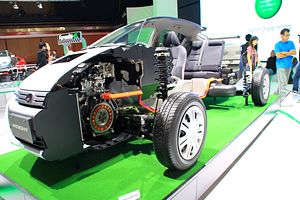Eight of Japan’s globally dominant auto manufacturers are teaming up with two of the country’s best universities in a project subsidized by the government to develop new, lower emission combustion engines. Nikkei Asian Review reports that Toyota Motor, Honda Motor, Nissan Motor, Suzuki Motor, Mazda Motor, Mitsubishi Motors, Daihatsu Motor, and Fuji Heavy Industries (owner of Subaru) are planning to develop a diesel engine by 2020 that will emit 30 percent less carbon dioxide than 2010 levels.
Two of Japan’s premier universities, the University of Tokyo and Waseda University, will contribute their research laboratories and the Japanese government will subsidize two-thirds of the initial year’s project costs. The project is expected to cost $19.7 million in its first three years beginning in fiscal 2014.
The Nikkei article states that each car manufacturer will contribute their own basic research findings to the project, as well as funds and engineers. They will also create a technology-sharing consortium called AICE, to be headed by Honda’s managing director of research and development Keiji Otsu.
The project’s main goal is to re-establish Japanese carmakers as the global leader in both fuel efficiency and low-emissions. While the popularity of electric vehicles has increased significantly in recent years, with Japanese manufacturers well positioned in that market, combustion-powered engines are still expected to compose 89 percent of worldwide production in 2030, according to a Fuji Keizai Group survey.
Considering Japan’s own population concerns, retaking the lead in high-growth segments of the international auto market will be a key concern for all of these manufacturers in the near future. The American car market is a significant portion of each of these manufacturers’ business, and new U.S. regulations initiated in 2009 will require an industry standard of 35.5 miles per gallon by 2016.
China, another huge market for Japanese automakers, is also grappling with the environmental costs of a rising middle class fueling demand for new cars. If Japanese companies can produce these new models at competitive prices in China, they will not only increase sales but also market share, in what is rapidly becoming one of the world’s most competitive auto markets with Volkswagen and General Motors making large investments there over the past few years.
The ability of Japanese companies to lead innovation and export technology was a hallmark of the last generation’s economic dynamism. The pooling of resources and cooperation between industry, government, and academic research has been a long-time Japanese strategy. If this latest research venture bears fruit, the Japanese auto industry is well positioned to retain its advantage in producing low-emission, fuel-efficient cars.

































